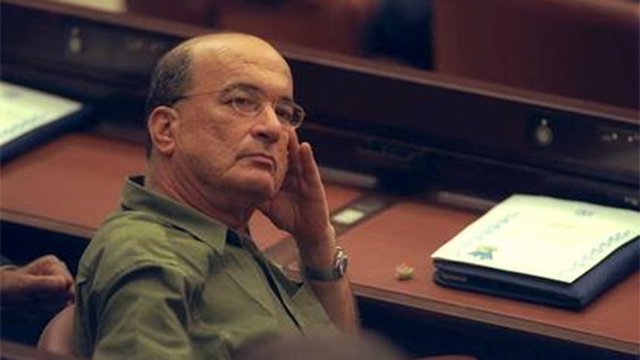
Gabi Ashkenazi
צילום: ירון ברנר
Ashkenazi's chance to redeem himself - by taking Barak to court
Op-ed: Ehud Barak leveled terrible accusations towards Gabi Ashkenazi when both were still holding office, all of which were found to be false. Perhaps Ashkenazi's inaction in the aftermath tell us something about his prospects in politics.
Life in Israel is hard, filled with danger. We live on a knife edge. During dire times, it's difficult to handle processes and fundamental issues. It's simpler and easier to veer into a nearby alley, focusing on an event rather than a process, on small things rather than on essence.

Take the Yom Kippur War for example, a seminal event in the age of the third temple. What did we do? Instead of discussing and analyzing the failures of the state leaders' policies, we wrapped them up in the technical term "oversight."
The year 2010 was called "the year of decision." A fateful question was on the table: Whether or not to attack Iran. There were valid and invalid arguments, grand messianic visions, and small political considerations. The issue had wide-ranging effects on the economy and on society, foreign relations, the relationships at the top, and on the identity of the IDF chief. It reared its head into the media and public conversation by way of a civilian document of no real importance.
Prosecutor Toni Goldenberg is set to indict Boaz Harpaz at the Tel Aviv Magistrate Court. This case, which in itself would be more at place in a small claims courtroom, is weak and brittle. Its rests entirely on one admission by the accused, and in opposition to over a dozen of his contrary statements.
The Attorney General's report on the matter stated that "Harpaz's statements cannot be given credence, especially not where matters of criminal law are concerned." It all depends on who is assigned the case. We already know from experience that the identity of the judge can determine the outcome. If the judge on the case is an autonomous and intelligent one, you may expect to see the State Attorney's Office facing more than a little embarrassment, as well as the Harpaz affair gaining new life in the public discourse.
One of the advantages of living in Israel is having a short and condensed chain of acquaintances. Everybody here knows everybody. The following story is told as an example, as well as a tribute to the late Yossi Sarid. Yossi used to call me almost every week, chat for a bit, express concern about the waves of nationalistic hatred in the country, get an update about this or that security or justice-related event. He called me at 11:16am on the day he died, and asked me to not respond to some inferior article by a narrow-minded reporter. The reporter used to regularly write articles against Yossi, and on that day he wrote one against me.

Yossi Sarid. Used to go by the measure of acquaintance. (Photo: Moshe Milner/GPO) (צילום: משה מילנר, לע"מ)
When the Harpaz affair was in the news, Yossi phoned me to ask what it was all about. I explained that there are no good or bad guys here, that both Ashkenazi and Barak were in the wrong, that it can't be defined with that kind of clear-cut value judgment. Don't confuse me with these judgments, Yossi said, I stick with the measure of acquaintance. When I lived in Margaliot, he said, I knew Ashkenazi, who was in the IDF's Northern Command back then. I knew Barak, boy did I know him, to be a political careerist, a schemer in uniform, during the Tze'elim B affair, during the association affair, during the Or Commission's deliberations, and I knew him when I was education minister in the government he led. He later wrote a witty article taking the measure of acquaintance in mind.
Ashkenazi's friends are enraged every time I say he isn't fit for politics, that his engine isn't burning hot enough, that he has no engine at all. Politics is a demanding field. You can only succeed there if there's a fire in you, and it better be on turbo.
Barak accused Ashkenazi of attempting a coup, of obstructing the government's decisions, of having a business relationship with Harpaz, of attempting to con his way into a fifth year in the IDF Chief of Staff office. All this and more: Barak sent a letter to AG Weinstein via his lawyer Navot Tel-Zur, accusing Ashkenazi of assisting in the taking of a bribe, of taking and giving bribes in matters related to IDF appointments. The letter called Ashkenazi the head of a pyramid of outlaws, who conspired to obstruct the goings-on of government. This letter of horrors made headlines in Haaretz and other media bodies on May 6, 2012.
I can't recall a precedent in which the defense minister of a democratic state drops such a thundering cluster bomb on the head of the military's top commander. Barak's accusations were, as we know, found to be completely false, malicious, fabricated, and plain mean, by the attorney general.
In order to be in politics, you need an engine. In order to not pass such an insult by, you need some self respect. I don't expect Ashkenazi to pave his way towards politics, but I do expect him to advance towards his rivals. Make confidence-building moves. I thinks there can't be a better, stronger case than this for a principle libel suit on a scale that hasn't yet been seen in Israel. Ashkenazi can vow in advance to donate the proceeds he gets to the community, education, and the periphery. Ashkenazi has a golden opportunity here to make up for his sins, raise a place, raise some money for the community through legitimate channels. This, in opposition to those who gather wealth, not necessarily legitimately, for themselves.
Amnon Abramovich is a Channel 2 News journalist.











